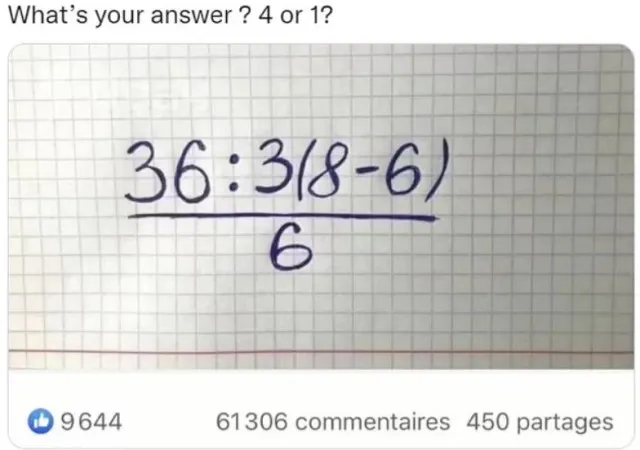A seemingly simple math problem for 11-year-olds has sparked heated debates online.
The question has Twitter users puzzled as they attempt to solve it using different conventions for the order of operations.
Can you slove this viral math question ?
The equation in question—36 ÷ 3(8 – 6)—has left many scratching their heads.
Some argue the answer is 4, while others firmly believe it’s 1.
The debate highlights the complexities of applying rules like BIDMAS (Brackets, Indices, Division, Multiplication, Addition, and Subtraction).

One person said: 36:3 is a ratio, therefore start with 36 divided by 3. Break this down and it is 12. Now deal with what’s inside the brackets and that is 8-6=2. Multiply the number outside the brackets with the number inside the brackets12(2) or 12×2=24. Therefore you get 24 over 6 which is a division. 24 divided by 6 = 4. The answer is 4. It’s in the kids sats papers, a tricky equation because of the ratio but the actual maths is not difficult…. of course if you fail to identify the ratio you won’t get the answer. Simples
A second wrote: It’s 36:3 = 12; then 12 times the content of the brackets (2), which is 24, then 24 divided by 6 = 4.
Division and multiplication have precedence over addition and subtraction, but the expression moves naturally from left to right.
Sixth Belgrade Gymnasium rules
While a third commented: 4.
After solving the brackets you do divisions and multiplcations from left to right so its
36/3=12
12*2=24
24/6=4
Someone else said: In Balkans that would be exactly 4. 36:3 = 12. Multiply by 2 (result of 8-6). So that’s 24. Divided by 6 – the 3nd result is 4.

What is BIDMAS and how does it work?
BIDMAS is a standard convention for solving equations. It dictates the sequence in which operations are performed:
1. Brackets
2. Indices
3. Division and Multiplication (from left to right)
4. Addition and Subtraction (from left to right)
Two different methods, two different answers
Solution 1: The aswer is 4
1. Solve the brackets: ( 8 – 6 = 2 ).
2. Replace the equation: ( 36 ÷ 3 × 2 ).
3. Proceed left to right: ( 36 ÷ 3 = 12 ).
4. Multiply: (12 × 2 = 24 ).
5. Divide by the denominator ( 6 ): ( 24 ÷ 6 = 4 ).
This method follows the standard left-to-right convention, often used by calculators.
Solution 2: The answer is 1
1. Solve the brackets: ( 8 – 6 = 2 ).
2. Treat ( 3(2) ) as one term: ( 36 ÷ (3 × 2) ).
3. Multiply: ( 3 × 2 = 6 ).
4. Divide: ( 36 ÷ 6 = 6 ).
5. Divide again by the denominator ( 6 ): ( 6 ÷ 6 = 1 )

This method considers numbers directly next to brackets as more connected, a less common approach but still valid.
Classrooms often avoid ambiguous problems like this, as they confuse students and rely heavily on interpretation. Most calculators and software favor the first method, considering it more technically correct.
So, what’s the correct answer? Both 4 and 1 can be justified, depending on the convention used.
This viral debate underscores the importance of clear communication in math problems. Next time you encounter a tricky equation, remember—context matters!